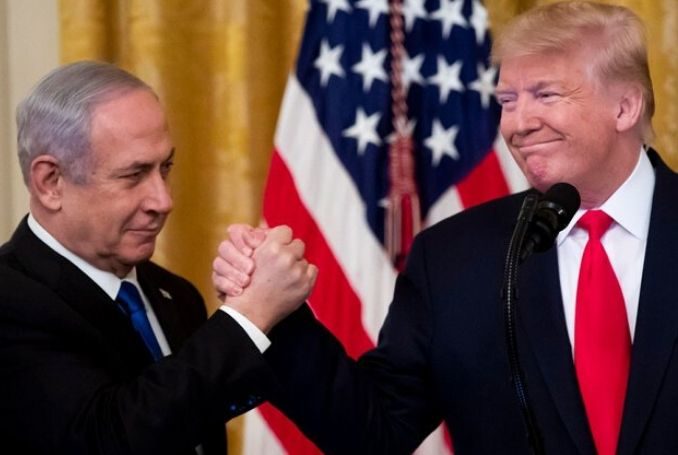
Trump’s peace plan proposal for the Palestinian-Israeli conflict is the most unbalanced towards the Jewish state’s interests in the past 50 years
After a three-year wait, Donald Trump’s plan, pompously dubbed the “Deal of the Century,” was finally revealed. As the adage goes, the elephant has given birth to a mouse, for the plan does not have the slightest chance of being implemented, and sooner rather than later, it will end up gathering dust in the attic of all the failed plans proposed since 1967. The American proposal endorses the policy of fait accompli carried out by Israel since the occupation of Gaza, the West Bank and East Jerusalem in the Six-Day War and thus clashes with international law, which prohibits the conquest of other states’ territories by armed force.
Since arriving in the White House, Trump has distinguished himself as a loyal ally of Israel. However, the American proposal has gone much further than expected, taking up the Israeli prime minister’s every demand to the letter, to the extent that it would be much more appropriate to call it the Netanyahu Plan, since his hand can be seen in the smallest details. In fact, the presentation of the deal fell to the Trump-Benjamin Netanyahu duo, evincing the leading role the Israeli leader had in its design.
Despite the fact that Trump described it as a deal in which both Israelis and Palestinians would win, the peace plan could probably be regarded as the most unbalanced of the past 50 years. First of all, it considers Jerusalem Israel’s indivisible capital. Second, it contemplates the annexation of large blocks of Israeli settlements in Palestinian territory, where close to 600,000 settlers are living illegally. Third, the plan guarantees Israel’s control over the entire Jordan Valley, which marks the border with Jordan. Fourth, it states that the issue of Palestinian refugees—a total of 5.5 million people—is not Israel’s concern, despite its being the main culprit, and that it will be solved outside its borders. And lastly, it proposes the creation of a mini-Palestinian state on the remaining territory in the event that the Palestinian Authority accepts this negotiating framework and rejects violence, once more deceptively linking the legitimate fight for Palestinian self-government with the war against jihad in the Middle East.
A Single Incentive: $50 Billion
The plan would require Palestinians to fight corruption, end hate speech and combat terrorism. The single incentive offered to them is an ambitious investment plan for the next decade, a total of $50 billion, although only half of it will go toward the occupied territories. This amount would be essentially paid for by those Gulf States that are allies of Washington in what could be considered a second chance for the “peace to prosperity” envisaged by Shimon Peres, which failed spectacularly.
The proposal, therefore, buries—who knows if permanently—the two-state solution backed by the international community since the Oslo Accords in 1993. This peace process generated quite a lot of process and very little peace. In President Trump’s opinion, his proposal is “a historic opportunity for the Palestinians to finally achieve an independent state of their very own. … [T]his could be the last opportunity they will ever have.” It follows that a visibly moved Netanyahu affectedly pointed out that “[i]t’s a great plan for Israel. … You have been the greatest friend that Israel has ever had in the White House.”
Legal Troubles for Both Leaders
Given that Trump aims to give his good friend Netanyahu a hand, the plan arrives at a providential moment. It is important to remember that both leaders have elections coming up in the following months and are going through serious legal troubles: The former is dealing with an impeachment, having pressured Ukrainian authorities to investigate the dark dealings of Joe Biden’s son; the latter is facing charges of fraud, bribery and abuse of trust in three corruption cases.
The icy staging of the plan is an indication of Trump and Netanyahu’s utter loneliness. Lacking the presence of any international leaders, the staging of the Trump-Netanyahu plan stands in contrast to what happened when the Oslo Accords were signed in 1993, when dozens of presidents and prime ministers gave their approval to what back then seemed the first step toward ending the Palestinian-Israeli conflict.

Leave a Reply
You must be logged in to post a comment.